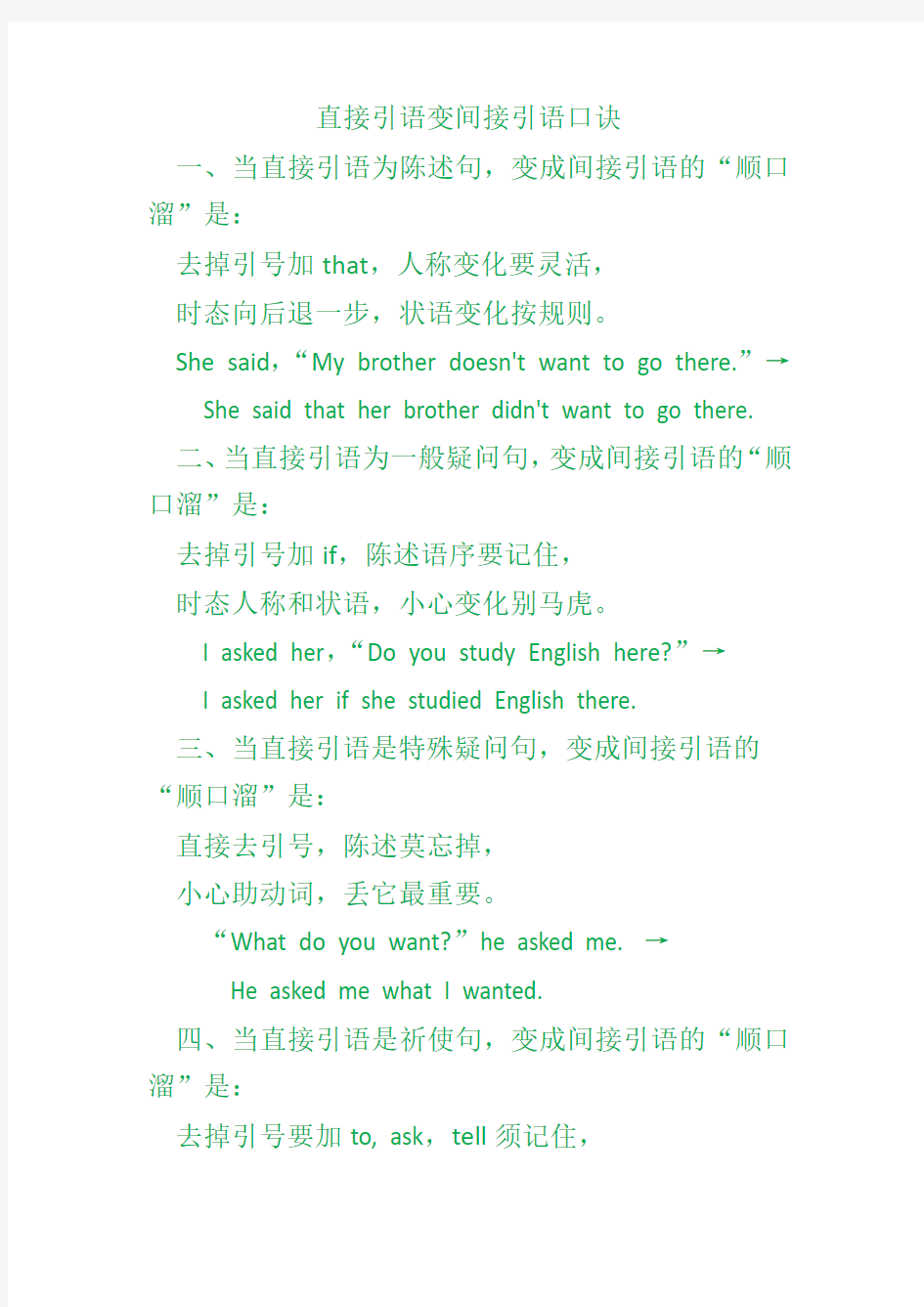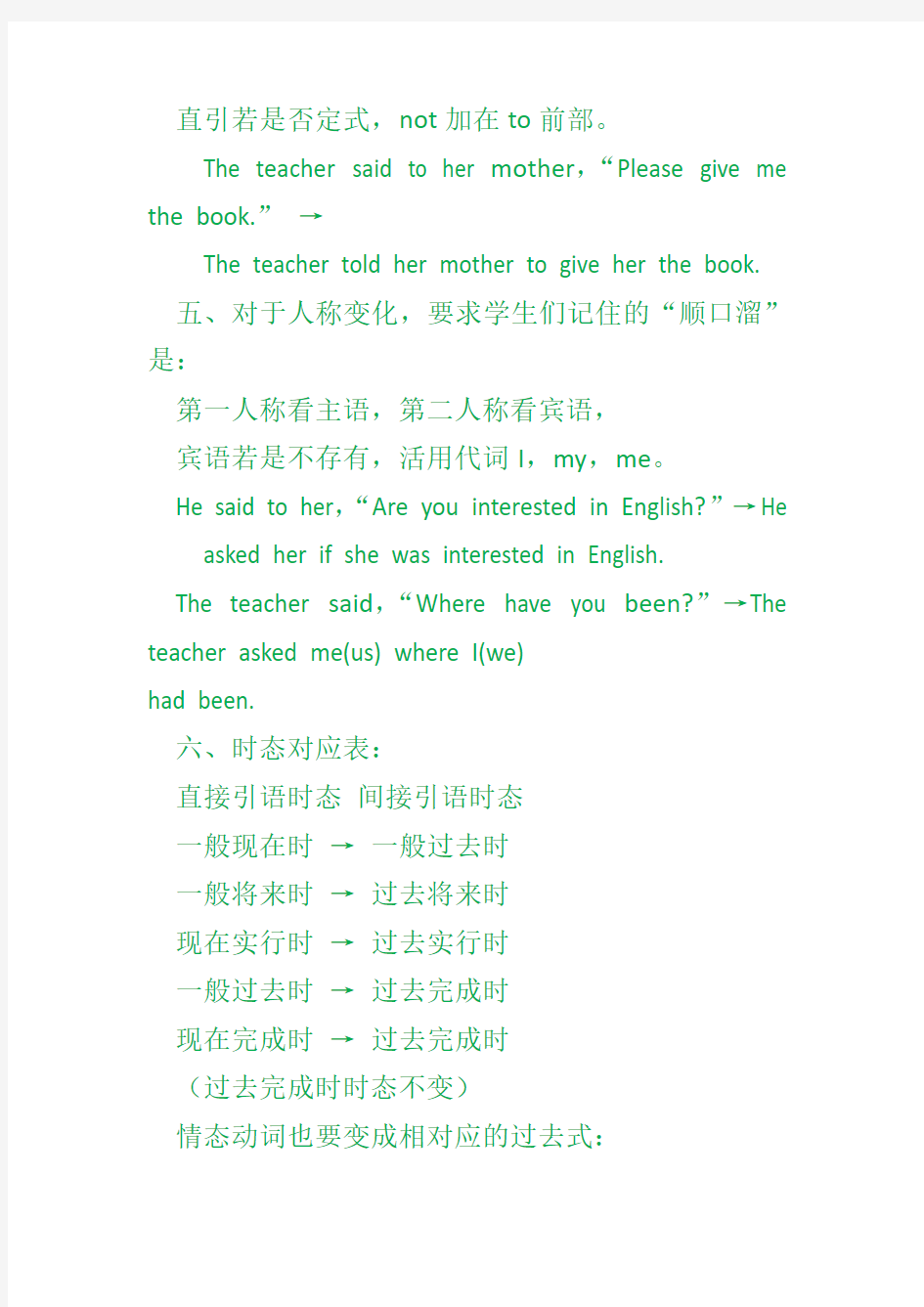直接引语变间接引语口诀


直接引语变间接引语口诀
一、当直接引语为陈述句,变成间接引语的“顺口溜”是:
去掉引号加that,人称变化要灵活,
时态向后退一步,状语变化按规则。
She said,“My brother doesn't want to go there.”→She said that her brother didn't want to go there.
二、当直接引语为一般疑问句,变成间接引语的“顺口溜”是:
去掉引号加if,陈述语序要记住,
时态人称和状语,小心变化别马虎。
I asked her,“Do you study English here?”→
I asked her if she studied English there.
三、当直接引语是特殊疑问句,变成间接引语的“顺口溜”是:
直接去引号,陈述莫忘掉,
小心助动词,丢它最重要。
“What do you want?”he asked me. →
He asked me what I wanted.
四、当直接引语是祈使句,变成间接引语的“顺口溜”是:
去掉引号要加to, ask,tell须记住,
直引若是否定式,not加在to前部。
The teacher said to her mother,“Please give me the book.”→
The teacher told her mother to give her the book.
五、对于人称变化,要求学生们记住的“顺口溜”是:
第一人称看主语,第二人称看宾语,
宾语若是不存有,活用代词I,my,me。
He said to her,“Are you interested in English?”→He asked her if she was interested in English.
The teacher said,“Where have you been?”→The teacher asked me(us) where I(we)
had been.
六、时态对应表:
直接引语时态间接引语时态
一般现在时→一般过去时
一般将来时→过去将来时
现在实行时→过去实行时
一般过去时→过去完成时
现在完成时→过去完成时
(过去完成时时态不变)
情态动词也要变成相对应的过去式:
can could; may might; must must/had to
“直”变“间”何时时态无需变
直接引语变为间接引语时,通常间接引语中谓语动词的时态是受主句中谓语动词时态约束的,主句的动词如果是过去时,间接引语中的动词也必须以某种过去时态出现。但是,在以下几种情况下,即使主句的动词是过去时,间接引语的动词所用时态仍然保持不变。
一、直接引语所述的是客观真理。如:
The teacher said to us, “The earth is round.”→
The teacher told us that the earth is round.
二、直接引语中有一个确切的过去时间状语。如:
He said, “I was born in 1970. ”→He said that he was born in 1970.
三、直接引语是过去完成时。如:
He said, “I had planted the trees before supper.”→He said that he had planted
the trees before supper.
四、直接引语是过去实行时。如:
He asked, “What were they doing when Tom left?”→He asked me what they were
doing when Tom left.
五、直接引语是经常发生的、习惯性的动作。如:
She said, “l always get up early in the morning.”→She said that she always
gets up early in the morning.
六、直接引语所述内容是个事实。如:
John said, “My uncle is a doctor.”→John said that his uncle is a doctor.
七、直接引语所述的动作或状态在转述时仍在继续实行。如:
She said, “My mother is ill.”→She said that her mother is ill. (现在仍病着)
八、直接引语中含有由when,while,since所引导的表示过去的时间状语从句,该从句的时态仍不变。如:
Mr Smith said to the workers, “John has worked very hard since he came here.”
→Mr Smith told the workers that John had worked very hard since he went there.
九、直接引语中的must,need,would,should,ought to,had better,
might,could等词一般用原来形式。亦可用其它适当方法代替,但要保持原义。如:
He said, “I must go early.”→He said that he must (had to)go early.
炒黄鳝中吃出上百条寄生虫
“太恶心了,黄鳝里面全是长形的寄生虫,短的五厘米,常的超过十厘米,颜色是棕褐色的。”近日,南京市的丁女士买了一斤多的黄鳝,本想给小孙子补充点营养,餐后才发现黄鳝里面有上百条寄生虫。“这些虫子生命力太强了,我用热水烫了黄山南三遍,它们还能存活,是在是太可怕了。”丁女士说,因为自己是老花眼,宰杀时并未发现寄生虫,洋葱炒黄鳝丝做好后,丁女士夫妇和小孙子吃了整整一盘,只留下一小碗给还未下班的儿媳妇儿,这些寄生虫也是儿媳妇在回家后才发现的。(扬子晚报)
